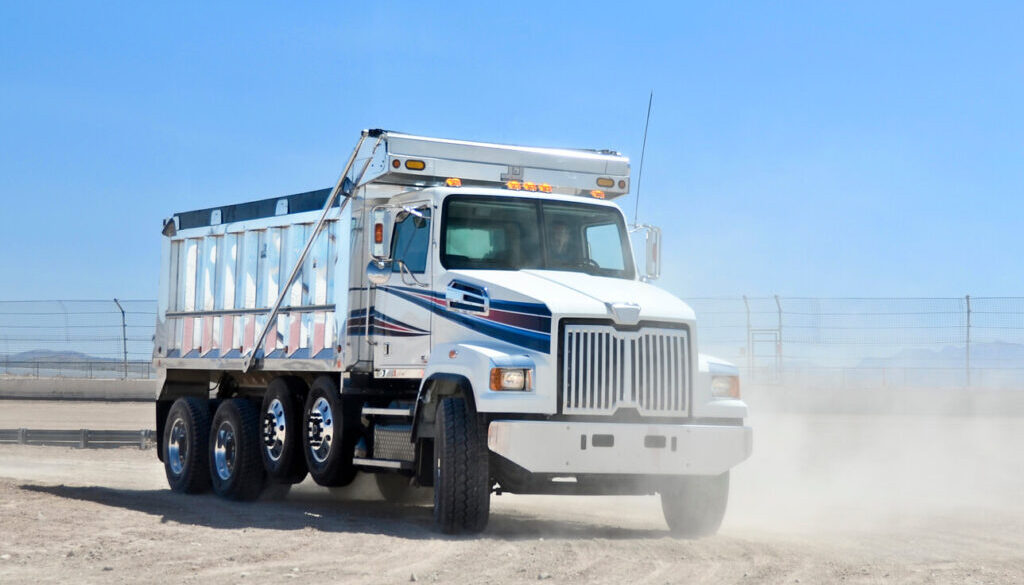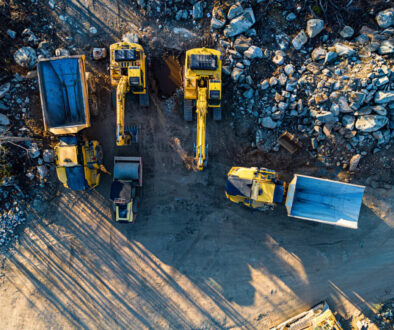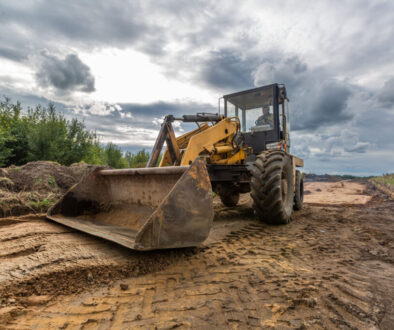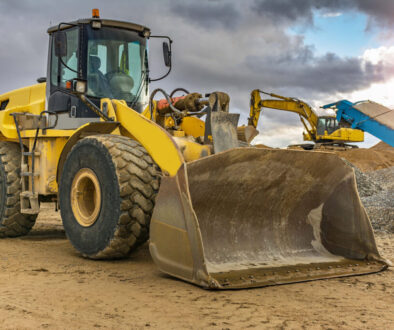Dump Trucks: Your Complete Guide to Types, Uses & Financing
Adding a dump truck to your fleet is a major step toward boosting your business’s hauling capacity. As the workhorses of construction, excavation, and material transport, these vehicles are essential for job site productivity.
This guide delivers practical information for contractors and fleet owners hitting key components, safety protocols, and smart buying decisions. We will walk you through the different types of dump trucks, their primary uses, and how to operate them safely and efficiently. Understanding these fundamentals helps you make an informed investment. Learn about flexible financing and quick approval so you can get to work without delay.
See more about the best places to buy online.
Quickly find the information you need:
-
-
- Best Dump Truck Brands for Reliability and Performance
- How to Operate a Dump Truck Safely
- Choosing the Right GVWR and Payload
- Types of Dump Trucks
- Buying Checklist: Questions to Ask
- Insurance Essentials for Dump Trucks
- Hydraulic System: How it Works
- Maintenance Tips for Maximum Uptime
- Dump Truck Financing Options
- Get Pre-Qualified Today
Key Parts and Components
Understanding the key features of a dump truck allows you to evaluate different machines and choose the best one for your needs. Every part is engineered for durability and performance under demanding conditions.
-
-
- Cab and Telematics: The cab is the operator’s command center. Modern cabs are designed for comfort and safety, often featuring ergonomic controls and excellent visibility. Numerous vehicles are equipped with sophisticated telematics systems that provide immediate data on location, fuel consumption, engine condition, and driving habits. This technology is critical for managing fleet efficiency and scheduling preventive maintenance.
- Engine and GVWR Matching: The engine, typically a high-torque diesel, provides the power needed to haul heavy loads. It is crucial to match the engine’s power to the truck’s Gross Vehicle Weight Rating (GVWR). A correctly sized engine operates efficiently, consumes less fuel, and experiences less stress.
- Dump Body and Hydraulics: The dump body, or bed, holds the material. Its size and material (steel or aluminum) depend on the intended application. The hydraulic system is the muscle behind the operation, using pressurized fluid to lift the bed for dumping. A reliable system ensures smooth, safe, and efficient unloading cycles.
- Chassis, Tires, and Axles: The chassis is the truck’s steel backbone, supporting the entire structure and payload. Sturdy axles and durable tires ensure stability and traction on uneven terrain.
-
Best Dump Truck Brands for Reliability and Performance
Choosing the right brand is just as important as choosing the right type of dump truck. Trusted manufacturers deliver long-lasting performance, strong resale value, and dependable support. For contractors and fleet managers, brand reputation can save time and money in the long run.
-
-
- Caterpillar (CAT): Known worldwide for heavy equipment, Caterpillar dump trucks are rugged, reliable, and built for demanding worksites. They excel in mining, construction, and large-scale earthmoving.
- Mack Trucks: A leader in vocational trucks, Mack is recognized for durability and advanced safety features. Their dump trucks are designed for construction and highway hauling.
- Kenworth: Well known for driver comfort and fuel efficiency. They offer dump trucks that combine good performance with smart technology features.
- Peterbilt: Peterbilt trucks are a favorite for their high-quality build and customizable options. They’re especially popular in fleets needing versatility and strong resale value.
- Volvo Construction Equipment: Volvo ADTs (articulated dump trucks) are very efficient for off-road hauling. They are known for their stability and advanced telematics.
- Freightliner: Many fleets in the U.S. choose Freightliner. They offer dump trucks that are budget-friendly and simple to maintain.
- International: International dump trucks are known for their reliability and robust build quality. Popular in both construction and municipal work, they offer a variety of models suitable for highway and off-road hauling, with strong dealer support and parts availability.
-
Each of these brands have strengths based on your project type and budget. Contractors doing heavy-duty, off-road work may choose Caterpillar or Volvo. Fleets that focus on road use and fuel economy may prefer Kenworth or Freightliner.
Ready to grow your business? Get pre-qualified for dump truck financing in minutes. No impact on your credit score.
How to Operate a Dump Truck Safely
Safety is the top priority in any operation involving heavy equipment. Adhering to established safety practices protects your operators, your equipment, and your business. Consistent daily checks and disciplined on-site procedures are non-negotiable.
Prior to beginning any shift, operators must conduct a comprehensive inspection to ensure the truck is functioning safely. This includes checking all essential systems to prevent malfunctions on the road or job site.
Daily Pre-Trip Inspection Checklist:
-
-
- Tires: Check for proper inflation, visible damage, and adequate tread depth.
- Brakes: Test both air and parking brakes to ensure they are responsive.
- Lights & Signals: Verify that headlights, brake lights, and turn signals are working.
- Hydraulics: Inspect lines for leaks and check fluid levels.
- Mirrors & Windows: Clean all surfaces for maximum visibility.
- Safety Equipment: Ensure the fire extinguisher and emergency triangles are secure.
-
On-site, always dump materials on stable, level ground to prevent rollovers. Ensure the area is clear of people and obstacles before raising the bed.
Using a spotter is highly recommended in congested areas or when visibility is limited. Always adhere to the truck’s GVWR to ensure safety and prevent stress on components.
Choosing the Right GVWR and Payload
Selecting a dump truck with the right GVWR and payload capacity is crucial for safety and profitability. The GVWR is the maximum legal operating weight of the truck, as determined by the manufacturer. This total includes the weight of the truck itself (curb weight) plus the fuel, operator, and the cargo (payload).
It’s important not to confuse GVWR with payload. Payload is the maximum weight of the material you can legally carry. To calculate it, you subtract the truck’s curb weight from its GVWR. Exceeding the payload capacity can lead to fines, premature wear, and dangerous operating conditions. When choosing a truck, consider the density of the materials you typically haul.
For example, a load of gravel is much heavier by volume than a load of mulch. Ensure your truck’s payload is sufficient for your densest materials.
A key consideration tied to GVWR is the need for a Commercial Driver’s License (CDL). In the U.S., a CDL is needed for vehicles over 26,001 pounds GVWR. Most standard and heavy-duty dump trucks fall into this category, making a CDL a necessity for your operators.
Types of Dump Trucks
Dump trucks come in various configurations, each designed for specific tasks, terrains, and payload requirements. Choosing the right dump truck is essential for maximizing job site efficiency.
-
-
- Standard Dump Truck: Built on a single chassis with the dump bed mounted to the frame, this is the most common and versatile type. It is maneuverable and ideal for general construction, material delivery, and smaller-scale excavation.
- Transfer Dump Truck: This setup features a dump truck towing a trailer with a movable cargo container. It allows for a second payload, making it useful in states with strict weight restrictions.
- Superdump Truck: A standard dump truck fitted with a trailing axle, which can be lifted. This extra axle increases the payload capacity while remaining within legal road limits.
- Articulated Dump Truck (ADT): ADTs have a pivot joint for excellent maneuverability on rough terrain. They are mainstays in large-scale earthmoving, mining, and major infrastructure projects.
- Off-Road Dump Truck: These are massive, heavy-duty machines built exclusively for mining and quarry work. They are not street-legal and are designed to haul immense payloads in controlled environments.
- Side Dump Truck: This truck unloads materials by tipping its bed to the side. This design is faster and more stable than traditional rear-dump models, especially on soft or uneven ground.
- Bottom Dump Truck: Also known as a “belly dump,” this truck releases material from a gate on the underside of the trailer. It is ideal for laying materials in long, even rows, such as in road construction.
- Class 8 Dump Truck: This is a federal weight classification for trucks with a GVWR over 33,000 pounds. Most standard, transfer, and superdump trucks fall into this class, serving as the backbone of heavy construction hauling.
-
Explore our guide: Best Dump Truck Brands For 2025
Buying Checklist: Questions to Ask
Whether you are purchasing a new or used dump truck, asking the right questions is key to a sound investment. A thorough due diligence process helps you avoid unexpected costs and downtime.
Start by defining your primary needs. What materials will you haul most often? What are the typical conditions of your job sites? Answering these questions helps narrow your search.
When you find a potential truck, use this checklist to guide your inspection and inquiries:
-
-
- What is the complete maintenance history? Ask for detailed service records. A well-documented history indicates responsible ownership and helps predict future maintenance needs.
- What is the condition of the frame and chassis? Inspect the frame for rust, cracks, or signs of stress. A compromised frame is a serious safety risk and can be costly to repair.
- Are the hydraulics, electronics, and tires in good condition? Check the hydraulic system for leaks or slow operation. Test all electronic components. Examine the tires for wear and age, as a new set represents a significant expense.
- What is the engine and transmission performance like? During a test drive, listen for unusual noises and check for smooth shifting. If possible, have a qualified diesel mechanic perform a comprehensive inspection.
- Does the truck include desired safety or technology upgrades? Features like backup cameras, advanced telematics, and blind-spot detection can improve safety and efficiency.
-
Insurance Essentials for Dump Trucks
Protecting your dump truck with the right insurance is not just a smart business decision; it’s a legal requirement. Proper coverage safeguards your assets, protects your employees, and ensures your business can continue operating after an unforeseen event.
Several key types of coverage are essential for dump truck owners:
-
-
- Liability Insurance: This covers injuries or damage to other people or their property if your truck causes an accident. It is required by federal and state law.
- Physical Damage Insurance: This protects your truck from events like collisions, rollovers, theft, or vandalism. It is crucial for protecting the value of your investment.
- Cargo Coverage: This insurance protects the materials you are hauling. If you transport valuable loads like specialized aggregates or contaminated soil, this coverage is vital.
- Roadside Assistance: This helps with emergencies like breakdowns or flat tires. It lets you reduce downtime and get back on the road fast.
-
Insurance costs can change based on factors like your driving history, truck type, location, and materials you carry. Working with an insurance provider who knows the construction industry can help you get the right coverage at a good price.
Hydraulic System: How It Works
The hydraulic system is the backbone of a dump truck, powering fast, controlled lift and dump cycles. Most rigs use either a two-line or three-line setup. In a two-line system, a pressure line carries fluid from the pump to the cylinder. A return line sends fluid back to the reservoir. A three-line system adds a power-beyond line. This allows for faster cylinder operation and supports multiple functions. This is useful on busy job sites.
Core components:
-
-
- Reservoir: Stores and helps cool hydraulic fluid
- PTO: Transfers engine power to the pump
- Pump: Generates pressure to raise the bed
- Hoses and fittings: Route high-pressure fluid safely
- Quick couplers: Enable fast connect/disconnect
- High-PSI filters: Protect components from contaminants
-
Proper maintenance is essential for keeping the hydraulic system in peak condition. Watch for warning signs like slow or jerky lifting, unusual noises during operation, or visible fluid leaks. Addressing these issues promptly helps ensure safe, reliable performance and protects the system from costly damage. Regular checks of the hydraulic fluid level and quality are also a key part of any preventive maintenance schedule.
Maintenance Tips for Maximum Uptime
A regular maintenance routine is the best way to keep your dump truck reliable and performing well over time. Proactive upkeep prevents costly breakdowns, improves safety, and maximizes your truck’s resale value.
Incorporate these essential practices into your operations:
-
-
- Daily Walk-Arounds: Before each shift, the operator should inspect tires, brakes, fluids, and lights. This simple habit catches small issues before they escalate.
- Follow Service Schedules: Adhere to the manufacturer’s recommended intervals for changing oil, filters, and other fluids. This is critical for engine and transmission health.
- Keep It Clean: Clean the chassis and dump bed often. This helps stop rust and makes it easier to check important parts.
- Monitor Tire Pressure: Properly inflated tires wear more evenly, improve fuel efficiency, and enhance vehicle stability.
- Address Issues Promptly: Never ignore warning lights or unusual noises. Prompt repairs are almost always cheaper and faster than fixing a major failure.
- Keep Detailed Records: Maintain a log of all service and repairs. Detailed records are invaluable for managing fleet health and prove the truck has been well-maintained when it’s time to sell.
-
Dump Truck Financing Options
Purchasing a dump truck is a significant capital investment. Flexible financing makes it manageable for businesses of all sizes. We offer a simple, efficient process to help you acquire the equipment you need, whether it’s new or used. Understanding your options is the first step. Lenders typically look at your time in business, cash flow, and credit history to determine rates and terms.
Our financing process is designed for speed and clarity:
-
-
- Apply Online: Our application is fast, simple, and has no impact on your credit score. You can complete it in minutes from any device.
- Submit Your Business Information: We evaluate your details to find the best financing options for you. Documentation often includes basic business info, bank statements, and equipment specifications.
- Receive a Quick Decision: We provide clear answers quickly, often on the same day. Our team works efficiently to eliminate long waits and uncertainty.
- Get Funded and Get to Work: Once approved, we move quickly to get you funded so you can purchase your truck and keep your projects on track.
-
Whether you’re buying from a dealer or a private party, we provide the support you need. Our team is here to guide you through every step.
Ready to add a dump truck to your fleet? Get pre-qualified now for fast, reliable financing.
Get Pre-Qualified Today
Ready to add a reliable dump truck to your business? Our financing process is fast, transparent, and built for contractors like you. With a simple application and support, we help you get the equipment you need to grow your business.
Take the next step. Contact our team to get pre-qualified and see how easy it is to secure funding for your next dump truck.
Looking for more heavy equipment options? See our Excavators: Your Complete Guide for Excavators -





